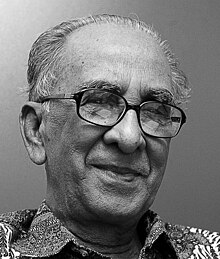Muhammad_Habibur_Rahman
Muhammad Habibur Rahman
Bangladeshi politician
Muhammad Habibur Rahman (3 December 1928 – 11 January 2014) was a Chief Justice of Bangladesh Supreme Court in 1995.[1] He was the Chief Adviser of the 1996 caretaker government which oversaw the Seventh parliamentary elections in Bangladesh.[1] He was a faculty member at the Department of Law, University of Rajshahi and University of Dhaka. Besides, being a language activist, advocate of the Bengali language, he wrote extensively and published eight books on the subject.[2] He played a significant role to implement Bengali in the Supreme Court of Bangladesh.[3] He wrote Jathashabdo (1974), the first thesaurus in the Bengali language.[4]
This article needs additional citations for verification. (July 2017) |
Rahman was awarded Bangla Academy Literary Award in 1984 and Ekushey Padak in 2007 by the Government of Bangladesh. He served as a Fellow of Bangla Academy, Asiatic Society of Bangladesh and Worcester College, Oxford.[1]
